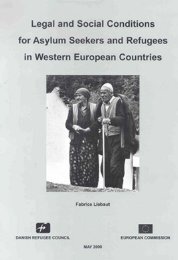Bulgaria - The social impact of seasonal migration
Bulgaria - The social impact of seasonal migration
Bulgaria - The social impact of seasonal migration
You also want an ePaper? Increase the reach of your titles
YUMPU automatically turns print PDFs into web optimized ePapers that Google loves.
It is interesting to note that representatives <strong>of</strong> the National Office <strong>of</strong> Border Police and<br />
<strong>of</strong> NGOs working with refugees have detected identical transformations in the refugees'<br />
<strong>social</strong> and educational pr<strong>of</strong>ile in the last couple <strong>of</strong> years, meaning that the push factors<br />
for their im<strong>migration</strong> are increasingly related to the economic conditions in the sending<br />
countries rather than to the political situation there. In the late 1990s, those seeking<br />
asylum in <strong>Bulgaria</strong> were predominantly richer, highly educated immigrants, most <strong>of</strong><br />
them Afghani, coming with their families. Now they come alone, are <strong>of</strong> lower education<br />
- sometimes illiterate in their own language - with no qualification and from peasant<br />
regions (interview No. 3). Before the war in Afghanistan, asylum seekers from<br />
Afghanistan comprised chiefly adherents <strong>of</strong> the former regime <strong>of</strong> Najibullah, with pro-<br />
Soviet views, legal businesses, and aversion to drugs. <strong>The</strong>y openly declared their<br />
political opinions, and the reason for their e<strong>migration</strong> was indeed political. After the<br />
American attack against Afghanistan, the pr<strong>of</strong>ile <strong>of</strong> Afghan immigrants radically<br />
changed. <strong>The</strong> recent Afghan asylum seekers are followers <strong>of</strong> the Taliban, and migrate to<br />
<strong>Bulgaria</strong> for economic reasons. From Afghanistan there come now illiterate people,<br />
drivers, and shepherds. At the moment, the educational level <strong>of</strong> Iraqi immigrants is<br />
much higher than that <strong>of</strong> the Afghani. <strong>The</strong> Iraqi refugees come alone or with their<br />
families. Yet the peak in family <strong>migration</strong> was in 2000-1 for all nationalities, whereas now<br />
families <strong>of</strong> refugees become rare. <strong>The</strong>re is a pronounced tendency for single, male<br />
<strong>migration</strong>: conforming to a typical Islamic strategy, the most educated and intelligent<br />
person from a kin group is sent abroad on the money <strong>of</strong> all the relatives; when he settles<br />
down successfully, he pulls out the rest <strong>of</strong> the relatives, too (interview No. 14).<br />
3.3. Conclusions<br />
<strong>The</strong> main factors for e<strong>migration</strong> are economic - the relatively high level <strong>of</strong> unemployment<br />
in <strong>Bulgaria</strong> and the low standard <strong>of</strong> living. In the last two years, the <strong>of</strong>ficial statistic has<br />
registered a relative economic growth, as well as decreasing unemployment. If this trend<br />
continues in the future, it will probably stabilise <strong>migration</strong>, too. As it has already been<br />
shown, potential and real migrants are oriented more to <strong>seasonal</strong> <strong>migration</strong>. Signing<br />
bilateral agreements will regulate this process and will prevent irregular <strong>migration</strong> in large<br />
numbers. <strong>The</strong> practice has shown that after the term <strong>of</strong> employment contracts abroad<br />
expires, the <strong>Bulgaria</strong>n workers return to the territory <strong>of</strong> <strong>Bulgaria</strong>.<br />
<strong>The</strong>re is a process <strong>of</strong> strengthening the control over and the struggle against trafficking<br />
in human beings which is another factor that will reduce in the future the illegal<br />
channels <strong>of</strong> e<strong>migration</strong>.<br />
Another important factor for e<strong>migration</strong> is the already created networks <strong>of</strong> relatives and<br />
friends, the diasporas, which will provoke and maintain a relatively stable flow <strong>of</strong><br />
emigrants. But at the moment, most <strong>of</strong> these networks function as a means for coping<br />
with current difficulties, i.e. they are oriented more to <strong>seasonal</strong> rather than to<br />
permanent <strong>migration</strong>.<br />
As for immigrants and refugees, there have been transformations in their <strong>social</strong> pr<strong>of</strong>ile<br />
in the last couple <strong>of</strong> years. <strong>The</strong> push factors for im<strong>migration</strong> are more related to the<br />
economic conditions in their countries rather than to the political situation there.<br />
47

















